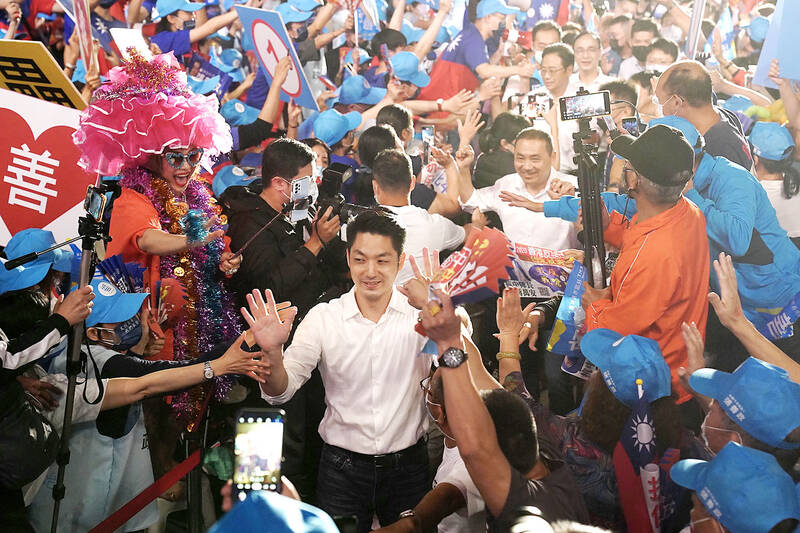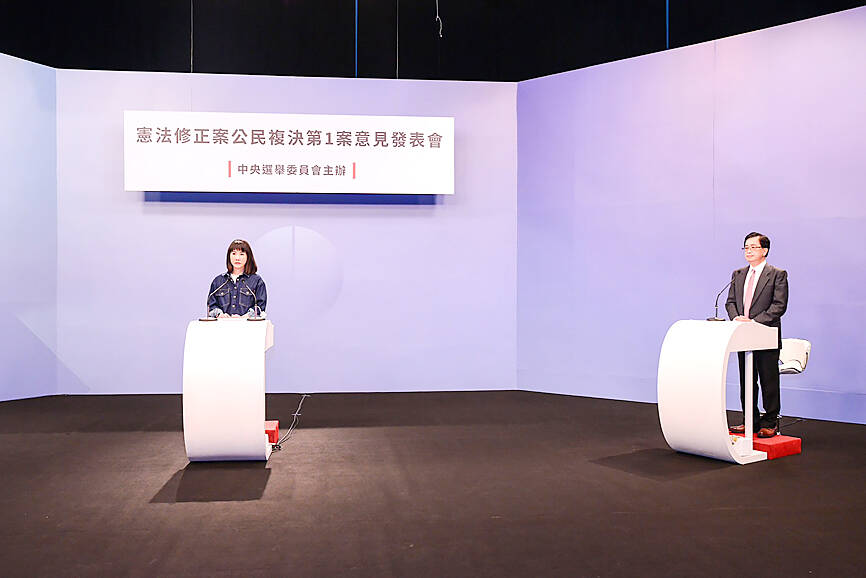Supporters of pan-blue politicians are urging people not to support a referendum to lower the voting age to 18, lawmakers and Taipei city councilors said yesterday, with some accusing Chinese Nationalist Party (KMT) leaders of duplicity and betraying the public’s trust.
Messages shared widely among pan-blue camp supporters are undermining the attempt to lower the voting age to 18, with the referendum to be held alongside the local elections on Saturday next week, independent Taipei City Councilor Meredith Huang (黃郁芬) said.
KMT politicians have again deceived people, saying in public that they support the referendum, which also seeks to lower the age of eligibility for candidacy to 18, Huang said, adding that former KMT legislator Chiang Wan-an (蔣萬安), the party’s Taipei mayoral candidate, should take a clear stand on the matter.

Photo: CNA
Chiang has repeatedly backed a “yes” vote in the referendum at public events, she said.
However, despite his pronouncements, many KMT supporters on social media have been calling for people to refuse the referendum voting papers, which would make it difficult to reach the turnout threshold required for it to pass, she said.
Messages posted on the Line messaging app in a group for Taipei civil servants — reportedly used mainly by KMT supporters — included one that read: “It is recommended not to pick up the referendum ballots, as it would lower the voting age to 18,” Huang said.

Photo: CNA
“If party central did not give instructions, it is hard for us to have a consensus,” was a reply from a separate user, Huang said, adding that the message went on to say: “Young people do not favor the blue camp, so I agree with you, but let us talk in private, because if this conversation leaks, it will be damaging.”
Democratic Progressive Party (DPP) Legislator Wang Ting-yu (王定宇) said that KMT Legislator Lee Te-wei (李德維), who is Chiang’s campaign spokesman, had agreed with the calls to undermine the referendum vote.
People had provided information showing that Su Yu-ying (蘇鈺英) — the director of the KMT’s chapter in Taipei’s Neihu District (內湖) and a deputy of group supporting Chiang in the district — wrote that she agreed that people should refuse to pick up referendum ballots to deny the threshold from being met, Wang said.
In a separate discussion, KMT supporters were debating whether to take the ballot, but vote “no,” he said.
“The KMT’s devious ploy has been laid bare,” Wang said. “Its supporters say positive things — pretending to be for young people and progress by making a public display of supporting a ‘yes’ vote — but in private, they do the opposite, undermining the effort.”
The party betrays the public’s trust,” he said.
In the past year, including during their campaign efforts, KMT candidates have sought to gain support from young people, so they spoke many times in public and in interviews about the party’s endorsement of the referendum, Huang said. “Legislator Chiang himself in the past few weeks has spoken of his support for lowering the voting age to 18, but in reality, he — along with KMT supporters — are playing a fraudulent game.”
“They are outwardly seeking public support, but internally they are networking to deny the ballot or vote against it,” she said.
Chiang told reporters yesterday that “those were only partial messages and were not the complete discussion.”
“My position has not changed, I strongly support the referendum to lower the voting age to 18, for young people to have rights as citizens, and I hope more people can join me to support this cause,” he said.

Chinese Nationalist Party (KMT) Chairman Eric Chu (朱立倫), spokeswoman Yang Chih-yu (楊智伃) and Legislator Hsieh Lung-chieh (謝龍介) would be summoned by police for questioning for leading an illegal assembly on Thursday evening last week, Minister of the Interior Liu Shyh-fang (劉世芳) said today. The three KMT officials led an assembly outside the Taipei City Prosecutors’ Office, a restricted area where public assembly is not allowed, protesting the questioning of several KMT staff and searches of KMT headquarters and offices in a recall petition forgery case. Chu, Yang and Hsieh are all suspected of contravening the Assembly and Parade Act (集會遊行法) by holding

PRAISE: Japanese visitor Takashi Kubota said the Taiwanese temple architecture images showcased in the AI Art Gallery were the most impressive displays he saw Taiwan does not have an official pavilion at the World Expo in Osaka, Japan, because of its diplomatic predicament, but the government-backed Tech World pavilion is drawing interest with its unique recreations of works by Taiwanese artists. The pavilion features an artificial intelligence (AI)-based art gallery showcasing works of famous Taiwanese artists from the Japanese colonial period using innovative technologies. Among its main simulated displays are Eastern gouache paintings by Chen Chin (陳進), Lin Yu-shan (林玉山) and Kuo Hsueh-hu (郭雪湖), who were the three young Taiwanese painters selected for the East Asian Painting exhibition in 1927. Gouache is a water-based

Taiwan would welcome the return of Honduras as a diplomatic ally if its next president decides to make such a move, Minister of Foreign Affairs Lin Chia-lung (林佳龍) said yesterday. “Of course, we would welcome Honduras if they want to restore diplomatic ties with Taiwan after their elections,” Lin said at a meeting of the legislature’s Foreign Affairs and National Defense Committee, when asked to comment on statements made by two of the three Honduran presidential candidates during the presidential campaign in the Central American country. Taiwan is paying close attention to the region as a whole in the wake of a

OFF-TARGET: More than 30,000 participants were expected to take part in the Games next month, but only 6,550 foreign and 19,400 Taiwanese athletes have registered Taipei city councilors yesterday blasted the organizers of next month’s World Masters Games over sudden timetable and venue changes, which they said have caused thousands of participants to back out of the international sporting event, among other organizational issues. They also cited visa delays and political interference by China as reasons many foreign athletes are requesting refunds for the event, to be held from May 17 to 30. Jointly organized by the Taipei and New Taipei City governments, the games have been rocked by numerous controversies since preparations began in 2020. Taipei City Councilor Lin Yen-feng (林延鳳) said yesterday that new measures by